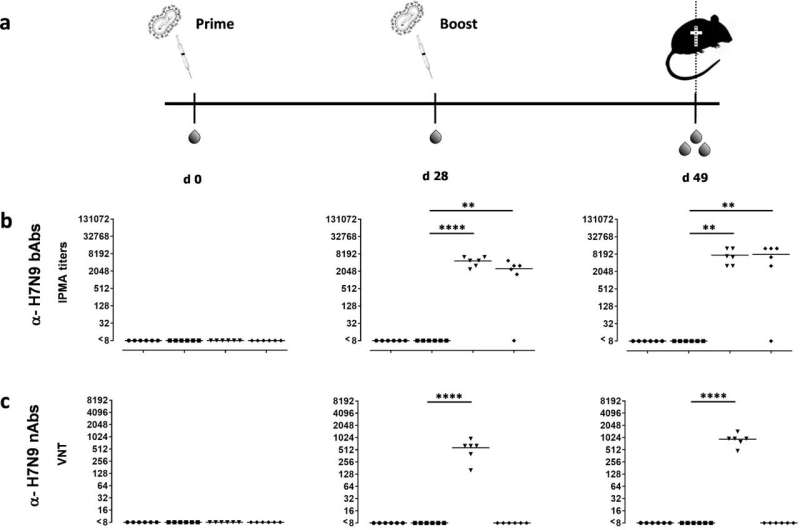This article has been reviewed according to Science X's editorial process and policies. Editors have highlighted the following attributes while ensuring the content's credibility:
fact-checked
proofread
Measles-based vector vaccine protects mice against influenza A (H7N9) virus

Researchers at the Paul-Ehrlich-Institut (PEI), in cooperation with the Philipps-Universität Marburg, used the "recombinant measles vaccine virus" vaccine platform to test vaccine candidates against the dangerous avian H7N9 influenza virus in an animal model. Vectored vaccines with a blueprint of haemagglutinin (H7) or neuraminidase (N9) induced specific antibodies in mice that could effectively inhibit H7N9 influenza viruses. H7-specific T cells were still detected in the animals two years after vaccination.
Vaccination against H7 completely protected the mice against disease after infection. Vaccination against N9 mostly provided protection against a severe disease course.
The avian H7N9 influenza virus was discovered in China in 2013. Since then, there have been more than 1,500 confirmed infected patients, 39 percent of which have died. The transmission is predominantly zoonotic from animal to human and rarely occurs from human to human. However, some adaptation of the virus to mammals has already been observed in ferrets. Effective and safe vaccines are needed to be prepared for potential pandemics.
The COVID-19 pandemic has shown that vaccine platform technologies allow for rapid adjustments of vaccines for protection against other viruses. This study used the "recombinant measles virus (MV)" platform, in which vaccine strain-derived measles viruses were used as a vector (transport vehicle) for the transmission of genes encoding the surface proteins haemagglutinin (H7) or neuraminidase (N9) of the H7N9 influenza virus.
The two model vaccines that were developed, MVvac2-H7 (P) and MVvac2-N9 (P), were tested on mice. The mice were vaccinated twice every four weeks and developed high antibody titers. Vaccination against N9 failed in one mouse.
The antibodies which formed not only bound to the H7N9 glycoproteins, but also prevented the haemagglutinin from binding to its receptor and the neuraminidase from being enzymatically active, which hinders the release of new virus particles. Thereby the influenza virus is inactivated and cannot cause disease anymore.
In addition to the antibody response, H7-specific T cells were also detected in the H7-vaccinated mice.
Three weeks after the second vaccination, some mice were infected with the H7N9 influenza virus. While the control mice became seriously ill that they all had to be euthanized, all the vaccinated mice survived, except for one that had been vaccinated with the N9 vaccine. The H7-vaccinated mice showed no signs of disease and their weight increased steadily over the course of the study. All but one N9-vaccinated mice fully recovered four days after a slight initial drop in weight.
Seven further mice were vaccinated per vaccine and kept for two years. After this time, there were three H7-vaccinated mice and two H9-vaccinated mice alive, coming close to the end of their natural lifespan. While there were no N9-specific T cell responses evident in the two H9-vaccinated animals, antigen-specific T-cell responses could still be provoked in the H7 mice. This is an indication of the longevity of this immune response.
This animal study shows that the vaccines with neuraminidase as an antigen can protect against influenza almost as well as vaccines with haemagglutinin antigen. The astonishing longevity of T-cell responses against haemagglutinin will be the subject of future research.
The paper is published in the journal npj Vaccines.
More information: Cindy Hörner et al, A protective measles virus-derived vaccine inducing long-lasting immune responses against influenza A virus H7N9, npj Vaccines (2023). DOI: 10.1038/s41541-023-00643-9




















